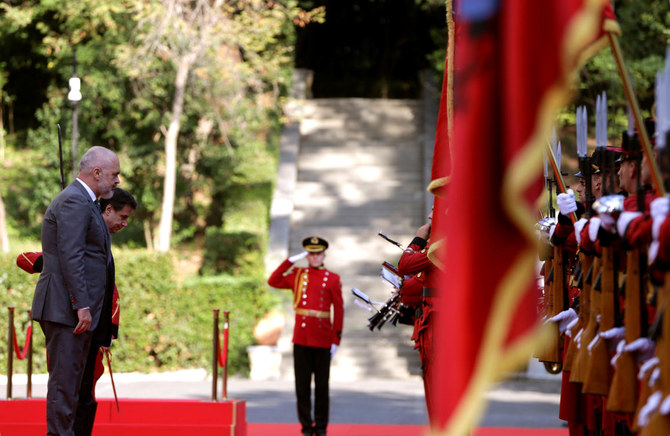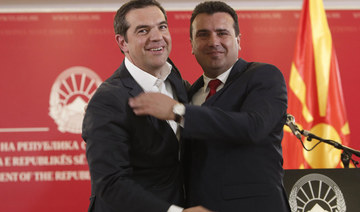BRUSSELS: The EU has made a “historic mistake” that risks destabilising the Balkans, senior officials warned Friday, after a handful of countries led by French President Emmanuel Macron again blocked membership talks for North Macedonia and Albania.
There was widespread frustration and disappointment, particularly among eastern European countries keen to broaden the EU club, at the failure of the 28 leaders to agree to start formal accession negotiations with Skopje and Tirana.
Leaders were deadlocked after some seven hours of heated backroom wrangling at a Brussels summit, with France alone in rejecting North Macedonia but joined by Denmark and the Netherlands in refusing Albania.
“It’s a major historic mistake and I hope it will only be temporary and won’t become engraved in the collective memory as a historic mistake,” European Commission chief Jean-Claude Juncker said.
Johannes Hahn, the European commissioner who has led efforts to push the two countries to reform to fit EU norms, said it had left the bloc’s credibility damaged “not only in the Western Balkans but beyond.”
“This is a matter of extreme disappointment,” he tweeted.
“To refuse acknowledgement of proven progress will have negative consequences, including the risk of destabilization of the Western Balkans, with full impact on the EU.”
North Macedonian President Stevo Pendarovski urged his people to push on with reform despite the disappointment, while his Foreign Minister Nikola Dimitrov urged the EU to come clean about its true intentions.
“If there is no more consensus on the European future of the Western Balkans... the citizens deserve to know,” he tweeted.
German Chancellor Angela Merkel said EU leaders would look again at the matter before a summit with Western Balkans leaders in Zagreb early next year.
The summit deadlock came days after EU ministers hit a similar impasse at talks in Luxembourg — following two earlier delays by EU countries on making a decision.
Apart from France, all the other EU states accept that North Macedonia has made enough progress on reforms — including changing its name from Macedonia to appease Greece — to start talks.
But Albania has less support, with the Netherlands and Denmark joining France in voicing serious reservations about its efforts against corruption and organized crime.
Austrian Chancellor Brigitte Bierlein said the summit failure was “extremely regrettable.”
“I have spoken to the two prime ministers to express my great disappointment, and they are also extremely disappointed,” she told reporters in Brussels.
“This is not a good sign for the solidarity of the EU or the stability of the region.”
EU Council President Donald Tusk told reporters he felt “really embarrassed” but urged the two countries not to lose heart, saying he had “absolutely no doubt” they would one day join the bloc.
“Both countries, they passed their exams, I can’t say this about our member states,” Tusk said.
The European Commission has said both countries have done enough to at least begin talks, but Macron now says this should not happen until the whole accession process has been reformed, arguing that it does not work properly.
But diplomats suspect the French are playing tough for domestic political reasons linked to immigration, and there is frustration that Macron appears to be trying to move the goalposts.
“These countries deserve it, they fulfil the criteria, the momentum is right,” said one diplomatic source.
“It’s not fair to change the rules of the game in the middle of the game.”
Another said “there’s no logic to it. It’s incoherent — an excuse.”
After the earlier failure in Luxembourg another diplomat accused France of “repeating the same stupid arguments again and again,” warning Paris would bear “responsibility for the consequences of this.”
Politicians in North Macedonia and Albania have warned that their people’s patience with the EU is not unlimited and repeated rejections risk emboldening nationalist and pro-Russian forces.
Anger over EU’s ‘historic mistake’ on Skopje, Tirana
Anger over EU’s ‘historic mistake’ on Skopje, Tirana

- A handful of countries led by French President Emmanuel Macron again blocked membership talks for North Macedonia and Albania
- EU Council President Donald Tusk told reporters he felt ‘really embarrassed’ but urged the two countries not to lose heart
US lawmaker Fine criticized by rights advocates, Democrats after anti-Muslim remarks

- Fine’s past comments include calling for the mass expulsion of all Muslims from the US, labeling of Muslims as “terrorists” and the mocking of the starvation and killing of Palestinians in Gaza, among others
WASHINGTON: Rights advocates and multiple Democrats on Tuesday condemned anti-Muslim comments by Republican US Representative Randy Fine who said on Sunday that “the choice between dogs and Muslims is not a difficult one.”
Fine, whose comments against Muslims have often sparked outrage, has dismissed the criticism and since doubled down on his remarks on social media. The Council on American-Islamic Relations designated the Republican US lawmaker from Florida as an anti-Muslim extremist last year.
“If they force us to choose, the choice between dogs and Muslims is not a difficult one,” Fine said on X on Sunday in a post that had over 40 million views as of Tuesday afternoon.
Some high-profile Democrats including California Governor Gavin Newsom called for him to resign while House of Representatives Minority Leader Hakeem Jeffries called Fine an “Islamophobic, disgusting and unrepentant bigot.”
Jeffries also called for Republicans — who hold a majority in both chambers of Congress — to hold Fine accountable.
“To ignore this is to accept and normalize it,” Democratic US Representative Alexandria Ocasio-Cortez said. Fine’s past comments include calling for the mass expulsion of all Muslims from the US, labeling of Muslims as “terrorists” and the mocking of the starvation and killing of Palestinians in Gaza, among others. Rights advocates have noted a rise in Islamophobia in the US in recent years due to a range of factors including hard-line immigration policies and white-supremacist rhetoric, as well as the fallout of Israel’s war in Gaza on American society.














